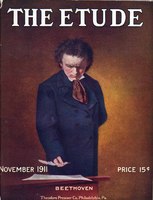At the Child-Welfare Exhibit given in New York this year, Mr. Percival Chubb, Professor of English at the Ethical Culture School, and a humanitarian of note, made an address in which was the following arresting statement:
“Education in our great cities is mainly a matter of protection against an environment which is unfavorable to the natural and healthy growth of the child. This complex urban world is no child’s world; it exercises no restraint upon its flaring publicity in the interest of childhood”
Prof. Chubb later explains that there are no newspapers, theatres or other healthy amusements particularly for children. Instead, we find in our newspapers a “mosaic of crime and scandal” supplemented by the comic section, products of “the newspaper vaudeville artist” who has lost his sense of humor, his ethical values and his taste, and who produces the humor of distortion akin to that provided for the parents in those inane cartoons which serve up daily and nightly in our yellow journals the misshapen, apelike creatures of a diseased imagination. Compare Alice in Wonderland and Uncle Remus with this rubbish. “… The moral task of the educator is to protect boys against smoking, drinking and gambling which they see around them (and there are recurring epidemics of these evils in our schools), and the girls against folly and immodesty in dress and all the vagaries of flaunting fashion.” The child must be protected against pernicious songs.
Best of all, Prof. Chubb points out the great remedy for the evils he has denounced. This remedy is “enlarging the opportunities of children for childish amusements and converse with things that are childlike.” Healthy books, healthy outdoor pastimes, healthy songs and music, healthy and absorbing study; these are the real enemies of the degrading influences surrounding our children. If these things are not made more interesting than the banal enticements which are thrown in the path of the young at every footstep, who is to blame but the teacher? If you, Mr. Teacher, have been teaching music in a hum-drum, dry-as-dust manner, expecting the pupil to take an all-consuming interest “on general principles,” you should realize that the moment your back is turned that very pupil will seek the excitement and interest which you have not provided for him. He will turn from his scales to The Hobo’s Picnic, he will desert his Czerny for The Pirate’s Bride, he will leave his octaves and arpeggios to stare at the lurid posters of “The Queen of the Opium Slaves.” The perverse fascination which these things possess is inexplainable. The music teacher who would be successful in every sense of the word must resort to every possible means to make his work particularly interesting at all times.



